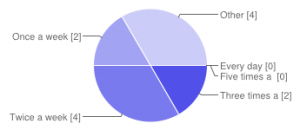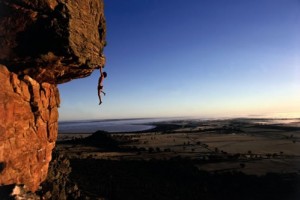The power of habit
(the video is a short TED talk, very student-friendly)
I’ve made significant progress over the last couple of years in cutting down the amount of things I have. Between my house and my office at work, I probably own less than 30% of what I owned at the end of 2010. This has been a hugely positive thing for me.
I’m not quite finished with the process, but it is well underway.
Lately I have been turning my attention to the things I do. Like the physical objects I owned and never used, I have a lot of habits that are not really adding value to my life. Trying to track time is a real eye-opener. The amount of time I spend doing things that don’t enhance my life and won’t pay off in the future is staggering.
The difference between things and habits is that it is very difficult to throw habits away.
Instead, I have been trying to adopt new ones. If successful, they naturally crowd out the old, less beneficial ones.
I’m just getting started with this, but so far it is going well. Here are a few new habits I have adopted this year:
1. study Japanese kanji/vocabulary first thing in the morning (before doing anything else on the computer) using anki
2. taking my granddaughter to baby swimming once a week (bonding time!)
3. writing 1,000 words a day (thanks, Stephen King)
4. planning my day first thing in the morning and last thing at night on paper
I still have a long way to go, but this has been a good start.
What habits have you consciously adopted? Is there anything you’d like to start?
Update Frequency Poll Results
A big thank you to everyone who participated in the update frequency poll this week. The results were fairly conclusive:
| Every day | 0 | 0% |
| Five times a week | 0 | 0% |
| Three times a week | 2 | 17% |
| Twice a week | 4 | 33% |
| Once a week | 2 | 17% |
| Other | 4 | 33% |
The ‘other’ responses were basically ‘whenever you like’, ‘weekly or fortnightly’, and ‘when you have something to say’ 🙂
I am going to move to a twice a week schedule with the blog, attempting to write something meaningful on Tuesdays and Fridays.
Wish me luck!
How much do you want it?
This post came out of a conversation I had on Facebook with my friend Mark. It reminded me of something I believe, and showed me how it applied to various different aspects of life in the same way.
We were talking about financial independence (which I define as not having to work for money because your basic needs are met by passive income) and it struck me that this is almost exactly the same as English ability.
Pretty much everyone I know would like to be good at English. If I could give them a magic pill (or upload it to their brain, a la Matrix) not one of them would turn it down. How to actually get good at English is not really a secret, either. Do a lot of reading and listening in English, speak as much as possible, and after enough practice you will be fairly competent. The thing is, few people are willing to put in the time and effort to do this.
Much like financial independence, which comes from spending less than you make and investing the difference. I don’t know anyone who wouldn’t want to be financially independent, either.
As a teacher, this is kind of tough for me.
I am not going to make much difference here. All my students want to be good at English, and most of them know what they should be doing to get there. They just aren’t motivated enough.
So I guess my job is to cajole, persuade, inform, and support. Maybe I can get a few more people to take the red pill 🙂
Update frequency poll
Hi everyone
A bit of housekeeping today. I’d like to figure out what my audience would like from the blog. My posting schedule varies from every day when I am feeling productive, all the way down to not posting for several weeks or months.
One thing I have noticed is that I get a lot more traffic when I post every day.
However, in my own blog-reading habits, I don’t normally want to see daily updates (I find they clog my inbox and rss reader). I much prefer a one to three posts a week schedule for almost all blogs I follow.
Of course, this blog is not all about me, but rather you, loyal readers. How frequently would you like to see new posts from me? I’d be really grateful if you could answer the poll below (just choose one of the options and click ‘submit’).
blogging earthquake expectations life in Japan living in Japan personal refugee
by sendaiben
leave a comment
Shock Therapy: how a geological event helped cement my minimalist leanings
This post was originally written for an ebook project that never happened. I’m happy to publish it here now.
Are you a wannabe minimalist? I was. It took a major natural disaster to change that.
I became interested in a minimalist lifestyle a couple of years ago. It started with Leo Babauta and Zen Habits, and progressed to Karol, Tynan, Baker, and others. It was appealing, and I spent hours reading articles, following blogs, looking at lists of possessions and checking out minimalist workspaces.
I didn’t actually do anything to change my life, but it was fun thinking about it.
I guess I had the desire but not the drive, the talk but not the walk. I suspect this may be very common, with a small core of people actually living a minimalist lifestyle, and a wider circle of spectators seeing the benefit but not taking action.
This all changed in March 2011. I was just getting ready to teach on an ordinary Friday afternoon when the fourth largest earthquake in recorded history hit the city I live in, doing substantial damage in itself and causing a devastating tsunami. Luckily my seven year-old students hadn’t arrived at the classroom yet, so I didn’t have to worry about them being hurt when everything in the room flew five feet sideways, including computers, tables, and bookshelves.
The earthquake lasted for about five minutes, which is about four and a half minutes too long for comfort. We’re used to earthquakes here, but they normally only last a few seconds. This one started, then got stronger and stronger, and everything just kept violently shaking for what seemed like forever.
After it finally stopped, I left the classroom and checked on some of our neighbors, then stood in a nearby park with other members of the community, all of us shocked into silence.
That evening I sat with my family in our large rental house by candlelight, surrounded by electrical appliances that no longer worked, huddling together for warmth under all our blankets and quilts.
The next day we foraged for food. Going through my daughter’s apartment, taking only food and water and leaving CDs, magazines, clothes, TVs, and furniture behind really made an impression on me. Likewise when we found all the shops closed and shuttered. Gas stations, chained up. Didn’t matter how good your credit was, how much money you had in your wallet.
We’re all just a couple of hours away from that.
That night, back at home taking stock, we received a couple of phone calls from friends and family abroad (I have no idea how they got through as the phone network was down) warning us about the unfolding nuclear accident in Fukushima. We live just under 100km away.
I made a quick decision based on a decision matrix taking into account what would happen under each of four scenarios: there were two variables, whether the accident was serious or not, and whether we left or not. The outcomes were, in turn:
1. the accident was not serious, and we stayed put: nothing happens
2. the accident was not serious, and we ran away: somewhat embarrassing and would cost some money
3. the accident was serious, and we stayed put: irradiation and mass panic when people realised what was happening
4. the accident was serious, and we ran away: safety and some monetary expense
There wasn’t much contest. I persuaded my family, we packed our cars, and we set off a couple of hours later, driving through the night and most of the next day until we got to relative safety in western Japan, several hundred kilometers and a mountain range away from the danger zone.
I locked our house and walked away from everything I owned that didn’t fit into a small bag. We got into the car and left forever as far as we knew.
And you know what? I didn’t care about any of it. For the four weeks we spent with relatives in Kanazawa, on the western coast of Japan, not once did I think of an actual thing we had left behind. Family? We took everyone with us. Friends? Yes. Students? Yes. Our stuff? Not once.
Not one piece of clothing, not one gadget, not one room of the (too) large house we rented.
And that’s when I became a real minimalist.
Just over two years after the event that changed everything, we are living in a small apartment (our rental house was structurally damaged and had to be knocked down), I haven’t bought anything physical for months (sadly, ebooks and music still draw my eye occasionally -I am not yet a digital minimalist), and I am consciously reducing the things I have left.
The next time we have to leave in the middle of the night, I’m hoping to be able to take everything with me.


